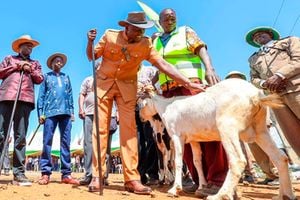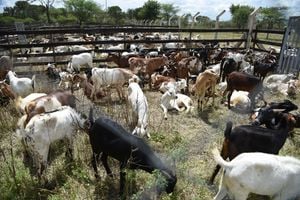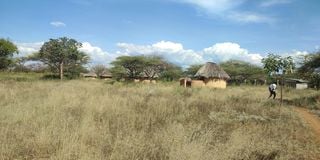
Part of the Kimalel goat auction grounds overgrown with shrubs and vegetation on November 4, 2014.
Dead silence and structures overgrown with shrubs and vegetation welcome you to the famous Kimalel goat auction grounds in Baringo South that has hosted the annual event for decades.
Herders have taken advantage of the overgrown vegetation in the paddocks and turned it into a grazing field for their cows and goats.
Traditional huts at the entrance to the auction grounds, usually used to display the cultural artifacts of diverse communities are also dilapidated and overgrown with vegetation.
The grounds covering more than 30 acres of land have a main dais where guests, including the sitting President who normally presides over the event, sit, and paddocks where goats for sale are held before the actual auction.
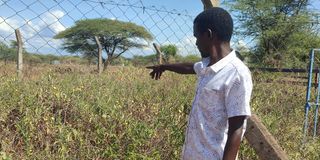
Some of the paddocks at the Kimalel goat auction grounds on November 4, 2024.
To improve the living standards of farmers in the region, most of whom depend on livestock keeping as their economic mainstay, the Kimalel goat auction, a brainchild of the late President Daniel Moi was birthed in 1986.
Even after he retired from active politics in 2002, Moi still attended the event.
By the time it was stopped, the annual event had seen over Sh50 million worth of sales of about 31,863 goats, 2,518 sheep, and hundreds of cows.
Late former nominated MP Ezekiel Barng’etuny was the one who organised the auction which would see over 8,000 goats sold in just one day, many of them through lots of bidding.
Devolution
With the advent of devolution, the county government of Baringo revived the auction in 2014 and introduced the cultural component to make it a fun-filled event, which has seen millions of shillings raised to support farmers.
Despite the vast land and structures at the Kimalel auction grounds, the facility is underutilised as only in use during the annual event attended by dignitaries drawn from across the country.
As December draws near, the devolved unit will, once again, deploy people to clear the bushes and refurbish the structures in preparation for the sale of the goats in this year’s annual event.
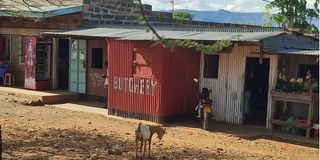
Some of the shops at the Kimalel goat auction in Baringo South.
It is a trend that worries Kimalel residents, that the facility is underutilised and left abandoned for the entire year, only being revived during the December annual three-day event when the sleepy auction grounds and the shopping centre become a beehive of activity.
The hustle and bustle that accompanies the three days of activities dissipates as soon as the goat auction ends and the auction site and centre return to their “sleeping mode" in anticipation of the next year's event.
Locals say they have always proposed to the devolved unit to have a monthly goat auction at Kimalel, but this has never been implemented.
Mr Richard Chebolei, a resident, has appealed to the county government to consider having the auction three times a year before the annual event.
“This auction is underutilised. How can we have such a famous facility that is only used three days a year, when it can be generating revenue for the devolved unit throughout the year and benefit the locals,” he said.
Locals also claim that despite hosting various heads of state and other dignitaries in the annual event over the years, they have not benefited, and still grapple with challenges and underdevelopment.
Goat auction
“When we gave out our land for the goat auction, we anticipated it would uplift our living standards. Sadly, this has turned out to be a monument of shame despite hosting dignitaries every year. We have nothing to show for the facility as it is only utilised once a year. We are sleeping on gold that should be generating a lot of revenue,” Mr Chebolei noted.
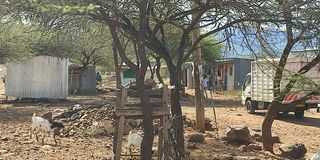
Some of the shops at the Kimalel goat auction in Baringo South.
“We have several social amenities in Kimalel including a dilapidated airstrip where the President and other dignitaries land during the auction. It is only refurbished when the annual event nears,” Mr Chebolei said.
He said several institutions including the health centre have been left in bad condition and local leaders have not visited them or considered upgrades.
“We want to benefit from hosting the Head of State on this ground every year because we feel that they only attend the sale of goats, then leave us with our problems. That is why this area has remained underdeveloped, and the nearby shopping centre remains sleepy throughout the year,” he said.
Residents also say proceeds collected from the sale of goats should come back to them and educate their needy children, as was done during the Moi era.
“Despite hosting the annual event, we have been left out in preparations and job opportunities during the auction. Apart from the sale of goats, we want to feel the importance of this auction as locals,” Mr Chebolei added.
To make the auction grounds active, he said, the county government unit should also set up offices at the grounds, including one for livestock affairs.
“We gave out land for the construction of public utilities including the airstrip, police station, a girl camp, and several others. If the National Government utilises the land, this area could develop,” he added.
Mr Cornelius Sergon, a youth from the area complained that they have not been involved in the event over the years. He said that they only get information from chiefs on how many goats are needed from every location.
“During the auction, sadly, we don’t even dictate the price of our goats to be sold, as it should be, we only get the prices during the actual event, which is normally dictated by politicians,” he said.
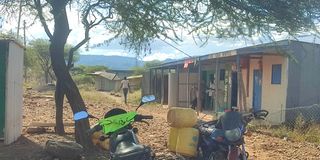
Some of the closed shops at the Kimalel goat auction in Baringo South.
“They should involve us in determining the market prices. The number of goats required from the farmers to be sold in the auction is very small, and few farmers get the chance. For that reason, this auction should be active every month so that farmers can get the opportunity to sell their livestock. We have a big name owing to the famous annual event, but we are still wallowing in poverty,” said Mr Sergon.
Nation.Africa learned that the Kimalel area is also grappling with water scarcity, which locals only get during the annual event, and supply stops after three days.
Elder Paul Kiyai claimed that during the auction, water is trucked for the livestock on sale and general use, and the taps run dry once the event is over.
“Once the event is over, we get back to our problems. We wonder why our local leaders have failed to sort out the problem or even tell the President when he attends the auction,” said Mr Kiyai.
When Nation.Africa visited, most of the shops in the trading centre were closed and business was minimal compared to the neighbouring Koriema centre, which was thriving with the beef business.
“We want to feel the presence of the President through development in this area,” added the elder.
Retired chief Jeremiah Kipkurere said Moi started the auction in 1986 to uplift the living standards of the locals, noting that the auction should live up to its dream.
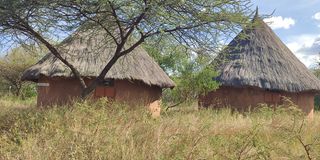
Some of the traditional huts used to display cultural artifacts from different communities during the annual Kimalel goat auction.
According to the retired chief, half of the proceeds from the auction during the Moi era went towards development, while half would go to the farmers who supplied the goats.
“Kimalel shopping centre is dilapidated and still lagging in business because locals here have a lot of challenges. Several shops are closed and will only be open during the event because. We want the sale of goats throughout the year to boost trade in this area,” noted Mr Kurere.
Ms Sylvia Kibet, a resident, said the county government should increase the number of goats from the locality sold during the auction.
“We cannot host such a big event annually and only get a small allocation of goats to take to the auction. We expect a higher number than other areas so that we can benefit as locals,” she said, noting women usually entertain the President and other dignitaries during the auction but have nothing to show.
At last year’s event, President William Ruto and his former deputy president Rigathi Gachagua bought more than 1,000 goats valued at Sh15 million. More than Sh40 million was raised in the annual event from the sale of more than 3,000 goats in minutes.

